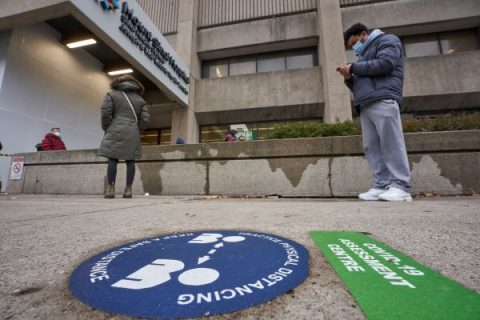By Thomas I. Likness
EBC News Service
(Eagle News) — Doctors in two Canadian provinces are being schooled in triage should hospitals find themselves with more patients than beds because of the Covid-19 pandemic.
In Ontario and Alberta, a record number of patients are being cared for in ICUs.
This has prompted public health officials to prepare for the worst — the grim task of deciding who will get life-saving treatment and who won’t.
Under Ontario’s triage protocol, patients are assigned one of four colors — red, purple, yellow and green, depending on their likelihood of surviving for one year.
Red patients have the lowest chance of survival, less than 20%. Green patients have a 70% chance or greater of living another 12 months. Green patients would be first in line for ICU beds, then yellow, purple and red.
Alberta’s plan, outlined in a 51-page document, is somewhat different.
In Phase 1, where 90% of the province’s ICU beds are occupied, only those with a 20% chance of surviving for a year would be admitted to critical care.
Phase 2 kicks in if 95% of ICU beds are occupied. Then patients would have to have a 50% chance or greater of surviving for 12 months to be eligible for critical care.
Pediatric cases in Alberta are only subject to triage during Phase 2.
Protocols can seem scary

The triage plans have a number of people concerned.
The Accessibility for Ontarians with Disabilities says people are scared of the protocol from Premier Doug Ford’s government.
“We keep hearing from people with disabilities that they are frightened and angry about the Ford Government’s approach to this critical care triage issue,” the group says in a post on its website. “This is so especially after they have had to put up with a year of suffering disproportionately from the COVID-19 pandemic and from the Ford Government’s ongoing failure to effectively address their urgent needs in its emergency planning.”
Alberta Chief Medical Officer of Health, Dr. Deena Hinshaw, says she understands that people are apprehensive when they hear that medical care may have to be rationed.
“These protocols are a last resort and can seem scary,” said Hinshaw. “But it is important that this work be undertaken as a precaution and that the necessary health care professionals have an understanding of what these protocols mean.”
“We’re not at the point now of needing to use this protocol and I hope that we never reach it,” she said.
(Eagle News Service)
